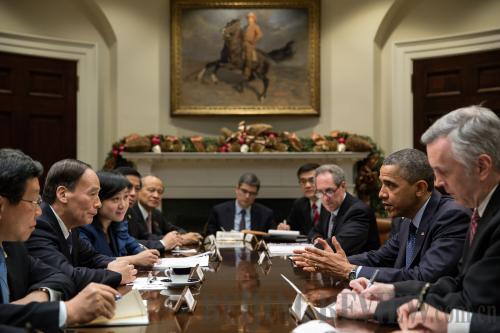|
 |
|
SHIFTING FOCUS: U.S. President Barack Obama (second right) meets with visiting Chinese Vice Premier Wang Qishan (second left) at the White House on December 20, 2012 (XINHUA) |
U.S. President Barack Obama's second inauguration triggered a new round of discussion among Chinese observers about the U.S. adjustment of its Asia-Pacific strategy. Old questions cropped up again: Is the move targeted at China? Will it lead to confrontational China-U.S. relations? And how should China deal with the situation?
Answers to those questions hidden within several key facts.
Washington's strategic adjustment is under the framework of its global strategy of "rebalancing." As U.S. interests are overstretched, it is still a bit early to conclude that Washington's Asia-Pacific strategic adjustment means that it has shifted its global strategic focus to the East. The United States generally deals with Middle East events with caution and consolidation. A more likely scenario is one in which Washington stands with one foot in Asia, while leaving the other in the Middle East.
The United States' Asia-Pacific strategic adjustment entails economic actions in addition to military deployment. The Obama administration has been advertizing the Trans-Pacific Partnership Agreement. To make up for lagging economic influence in Asia, the United States proposed a plan to expand economic ties with ASEAN aimed at paving the way for a future U.S.-ASEAN free trade zone. In the meantime, it adjusted policies toward Southeast Asian nations like Myanmar, Cambodia and Laos, strengthened strategic relations with Viet Nam, and became actively involved with regional affairs, such as South China Sea territorial disputes and water resource development in the upper reaches of the Mekong River. These acts, in effect, place wedges between China and its neighbors.
Washington's strategic adjustment is less alarming than it sounds. Bogged down in a serious financial crisis, the United States will be forced to restrict spending and reduce deficits to solve its economic problems. Although the Obama administration has declared that nothing could influence its military input in the Asia-Pacific, it must accept a limited scope as to its development plans in light of the current crisis.
By analyzing the true intentions behind Washington's Asia-Pacific strategy, Beijing can reach a rational and objective judgment concerning U.S. actions toward China during its strategic adjustment.
Debating endlessly whether the U.S. strategic move targets China is ultimately fruitless. The United States has repeatedly asserted that its Asia-Pacific strategic adjustment is not meant to target China. However, China should not be swayed by such public relations efforts. The United States has already made it plain that it sees China as its top competitor, and the latter's emergence is a major reason for the Asia-Pacific and global strategic adjustment of the United States.
Still, it would be a kneejerk reaction to say that Washington's strategy is entirely focused on containing, or even smothering, Beijing's rise. The United States has long alternated between its dual tactics of engagement and containment. It is strengthening both policies as China's status changes, forming a network that can regulate China effectively. Washington needs China's cooperation in order to deal with economic, political, security and other global problems, which is why it has to stick to the basic framework of hedging its bets.
Rather than taking a confrontational approach, China should adopt a mix of competition and cooperation as an answer to the United States' Asia-Pacific strategic adjustment.
China should first steadily strengthen relationships with neighbors. While ensuring its key interests are well protected, it needs to deepen friendly relations with neighboring nations, forming an amicable, tranquil and prosperous neighborhood by boosting trade, investment and cultural exchanges. This is the basic way in which China could grow from an Asian power to a positively viewed global power, and is also the most effective method to release strategic pressures launched by the United States. As long as China acts prudently, its neighbors will not turn entirely to Washington.
| 